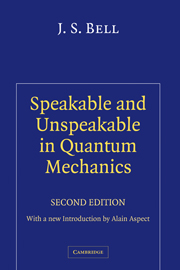Book contents
- Frontmatter
- Contents
- List of papers on quantum philosophy by J. S. Bell
- Preface to the first edition
- Acknowledgements
- Introduction: John Bell and the second quantum revolution
- 1 On the problem of hidden variables in quantum mechanics
- 2 On the Einstein–Podolsky–Rosen paradox
- 3 The moral aspect of quantum mechanics
- 4 Introduction to the hidden-variable question
- 5 Subject and object
- 6 On wave packet reduction in the Coleman–Hepp model
- 7 The theory of local beables
- 8 Locality in quantum mechanics: reply to critics
- 9 How to teach special relativity
- 10 Einstein–Podolsky–Rosen experiments
- 11 The measurement theory of Everett and de Broglie's pilot wave
- 12 Free variables and local causality
- 13 Atomic-cascade photons and quantum-mechanical nonlocality
- 14 de Broglie–Bohm, delayed-choice double-slit experiment, and density matrix
- 15 Quantum mechanics for cosmologists
- 16 Bertlmann's socks and the nature of reality
- 17 On the impossible pilot wave
- 18 Speakable and unspeakable in quantum mechanics
- 19 Beables for quantum field theory
- 20 Six possible worlds of quantum mechanics
- 21 EPR correlations and EPW distributions
- 22 Are there quantum jumps?
- 23 Against ‘measurement’
- 24 La nouvelle cuisine
23 - Against ‘measurement’
Published online by Cambridge University Press: 11 April 2011
- Frontmatter
- Contents
- List of papers on quantum philosophy by J. S. Bell
- Preface to the first edition
- Acknowledgements
- Introduction: John Bell and the second quantum revolution
- 1 On the problem of hidden variables in quantum mechanics
- 2 On the Einstein–Podolsky–Rosen paradox
- 3 The moral aspect of quantum mechanics
- 4 Introduction to the hidden-variable question
- 5 Subject and object
- 6 On wave packet reduction in the Coleman–Hepp model
- 7 The theory of local beables
- 8 Locality in quantum mechanics: reply to critics
- 9 How to teach special relativity
- 10 Einstein–Podolsky–Rosen experiments
- 11 The measurement theory of Everett and de Broglie's pilot wave
- 12 Free variables and local causality
- 13 Atomic-cascade photons and quantum-mechanical nonlocality
- 14 de Broglie–Bohm, delayed-choice double-slit experiment, and density matrix
- 15 Quantum mechanics for cosmologists
- 16 Bertlmann's socks and the nature of reality
- 17 On the impossible pilot wave
- 18 Speakable and unspeakable in quantum mechanics
- 19 Beables for quantum field theory
- 20 Six possible worlds of quantum mechanics
- 21 EPR correlations and EPW distributions
- 22 Are there quantum jumps?
- 23 Against ‘measurement’
- 24 La nouvelle cuisine
Summary
Surely, after 62 years, we should have an exact formulation of some serious part of quantum mechanics? By ‘exact’ I do not of course mean ‘exactly true’. I mean only that the theory should be fully formulated in mathematical terms, with nothing left to the discretion of the theoretical physicist … until workable approximations are needed in applications. By ‘serious’ I mean that some substantial fragment of physics should be covered. Non-relativistic ‘particle’ quantum mechanics, perhaps with the inclusion of the electromagnetic field and a cut-off interaction, is serious enough. For it covers ‘a large part of physics and the whole of chemistry’. I mean too, by ‘serious’, that ‘apparatus’ should not be separated off from the rest of the world into black boxes, as if it were not made of atoms and not ruled by quantum mechanics.
The question, ‘… should we not have an exact formulation …?’, is often answered by one or both of two others. I will try to reply to them: Why bother? Why not look it up in a good book?
Why bother?
Perhaps the most distinguished of ‘why bother?’ers has been Dirac. He divided the difficulties of quantum mechanics into two classes, those of the first class and those of the second. The second-class difficulties were essentially the infinities of relativistic quantum field theory. Dirac was very disturbed by these, and was not impressed by the ‘renormalisation’ procedures by which they are circumvented. Dirac tried hard to eliminate these second-class difficulties, and urged others to do likewise.
- Type
- Chapter
- Information
- Speakable and Unspeakable in Quantum MechanicsCollected Papers on Quantum Philosophy, pp. 213 - 231Publisher: Cambridge University PressPrint publication year: 2004
- 7
- Cited by



